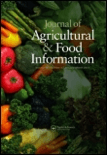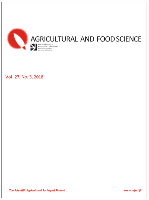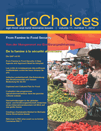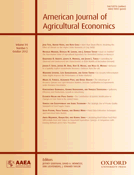
Journal of Agricultural & Food Information
Scope & Guideline
Connecting Insights for a Food-Secure Future.
Introduction
Aims and Scopes
- Interdisciplinary Research on Agriculture and Food Systems:
The journal emphasizes research that integrates various disciplines, including social sciences, environmental studies, and health, to explore the complex interrelations within agricultural and food systems. - Focus on Sustainable Practices:
There is a consistent focus on sustainable agricultural practices, food security, and the impact of climate change on farming, highlighting the need for resilience and adaptability in agricultural systems. - Emphasis on Policy and Education:
The journal includes studies that examine agricultural policies, educational initiatives, and literacy programs that aim to enhance understanding and participation in sustainable agriculture. - Global and Local Perspectives:
Research that considers both global agricultural trends and local practices is prioritized, reflecting the diverse contexts in which agricultural challenges and innovations occur. - Health and Nutrition Connections:
The journal explores the links between agricultural practices, food production, and public health, particularly in relation to nutrition and food safety.
Trending and Emerging
- Climate Change and Agriculture:
There is an increasing focus on the intersection of climate change and agricultural practices, highlighting the urgent need to address environmental impacts and promote resilience in farming systems. - One Health Approach:
Emerging research is adopting a One Health perspective, recognizing the interconnectedness of human, animal, and environmental health, which is critical in addressing global health emergencies. - Food Justice and Equity:
Research themes related to food justice, equity, and the role of marginalized communities in agricultural practices are gaining traction, emphasizing the social dimensions of food systems. - Data and Technology in Agriculture:
The integration of data-driven approaches and technology in agriculture is a trending theme, reflecting the growing importance of analytics, precision farming, and digital tools in enhancing agricultural productivity. - Neglected and Underutilized Crops:
There is a rising interest in neglected and underutilized crops as potential solutions for food security, sustainability, and biodiversity, indicating a shift towards diversifying agricultural systems.
Declining or Waning
- Historical Agricultural Practices:
Themes related to historical agricultural practices and their documentation have seen a decline, possibly due to a shift towards more contemporary issues such as technology and climate change adaptation. - Traditional Crop Studies:
Research focusing on traditional crop cultivation methods and their social contexts has become less frequent, indicating a possible pivot towards more innovative agricultural practices and food technologies. - Local Food Movements:
While local food movements were once a major focus, there appears to be a waning interest in grassroots initiatives in favor of broader systemic analyses that encompass global food supply chains.
Similar Journals

China Agricultural Economic Review
Championing Research for Sustainable Agricultural FuturesChina Agricultural Economic Review, published by EMERALD GROUP PUBLISHING LTD, is a premier journal that holds a significant position in the fields of agricultural economics and biological sciences. With its ISSN 1756-137X and E-ISSN 1756-1388, this journal has dedicated itself to advancing academic discourse since its inception in 2008 and continues through 2024. It boasts an impressive Q1 ranking in both Agricultural and Biological Sciences and in Economics and Econometrics, reflecting its high-quality research contributions, as evidenced by its standing in the top percentiles of Scopus rankings (97th and 92nd, respectively). Aimed at fostering scholarly exchange among researchers, professionals, and students, the journal invites original research articles, reviews, and case studies that explore vital issues and developments impacting agricultural economies, with a keen focus on both theoretical and practical advancements. As a well-regarded platform within the United Kingdom, the journal promotes accessibility and encourages significant contributions to enhance the understanding of agricultural economic dynamics worldwide.

Asian Journal of Agriculture and Development
Transforming agricultural practices through rigorous scholarship.Asian Journal of Agriculture and Development is a prestigious academic journal dedicated to advancing the field of agricultural research and development within the context of Southeast Asia. Published by the Southeast Asian Regional Center for Graduate Study and Research in Agriculture, this journal plays a vital role in disseminating innovative findings and best practices critical for sustainable agricultural development in the region. With a focus on interdisciplinary studies that integrate agricultural science, policy development, and socio-economic factors, the journal invites researchers, professionals, and students to contribute rigorous research that addresses contemporary challenges faced by the agriculture sector. Although it operates within a non-open access framework, the journal aims to ensure wide visibility and accessibility of its publications through strategic collaborations and institutional partnerships. By engaging with its content, stakeholders can gain valuable insights and foster meaningful dialogue that drives forward agricultural progress in Asia.

AGRICULTURAL AND FOOD SCIENCE
Innovating food science for global food security.AGRICULTURAL AND FOOD SCIENCE is a prestigious journal published by the SCIENTIFIC AGRICULTURAL SOCIETY OF FINLAND, dedicated to advancing knowledge in the fields of agricultural and food sciences. With an ISSN of 1459-6067 and E-ISSN of 1795-1895, this open-access journal has been providing valuable insights and research findings since its inception in 2002. As of 2023, it holds a Q3 ranking in Food Science and is positioned at the 46th percentile within its Scopus category, ranking 210 out of 389 journals in Agricultural and Biological Sciences – Food Science. The journal features contributions from a global network of researchers, covering various topics including sustainable agricultural practices, food safety, and innovative food technologies. Based in Finland, the journal serves as an essential platform for scholars, professionals, and students who are committed to enhancing food security and agricultural productivity through rigorous scientific research. The convergence of interdisciplinary studies from 2004 to 2024 marks a critical evolution in the scope of agricultural and food research, making this journal a vital resource for anyone involved in these dynamic fields.

Studies in Agricultural Economics
Elevating Agricultural Economics through Open AccessStudies in Agricultural Economics is a premier journal published by AGRARGAZDASAGI KUTATO & INFORMATIKAI INTEZET in Hungary, focusing on innovative research in the interdisciplinary fields of agricultural, biological, and economic sciences. Since becoming an Open Access journal in 1997, it has aimed to enhance the visibility of agricultural economics scholarship while promoting global engagement among researchers, practitioners, and policymakers. With its robust Q2 and Q3 rankings across varied categories including Development and Geography, this journal serves as a significant platform for disseminating cutting-edge studies that address crucial issues in agriculture and rural development. The journal's continuous publication since 2011 until 2024 exemplifies its commitment to providing timely insights into evolving agricultural challenges. With a strong Scopus ranking across multiple domains, particularly in the social sciences and agricultural sectors, it stands as a vital resource for anyone looking to advance knowledge and practice in these critical areas.

Advances in Agriculture
Transforming Agriculture with Open Access InsightsAdvances in Agriculture is a prominent Open Access journal dedicated to the dissemination of high-quality research in the fields of agriculture, agronomy, animal science, food science, and soil science. Published by HINDAWI LTD from the United Kingdom, this journal has made significant strides since its inception in 2014, contributing to the advancement of agricultural knowledge and practices. With an impressive impact factor reflected in its tiered quartile rankings, notably Q2 in Agricultural and Biological Sciences (miscellaneous), Agronomy and Crop Science, and Animal Science and Zoology, it serves as a key platform for innovative research and applied science. The journal aims to provide researchers, professionals, and students with rich access to groundbreaking studies that can help shape sustainable agricultural practices and policies. Emphasizing a global audience, Advances in Agriculture promotes an inclusive dialogue among scholars to tackle contemporary challenges in agriculture, enhancing food security and environmental stewardship worldwide.

PAKISTAN JOURNAL OF AGRICULTURAL SCIENCES
Fostering Sustainable Solutions in Agricultural SciencesWelcome to the Pakistan Journal of Agricultural Sciences, a prominent platform for disseminating vital research findings in the fields of agronomy, crop science, food science, plant science, and soil science. Published by the prestigious University of Agriculture in Faisalabad, this journal aims to enhance the scientific discourse surrounding agricultural innovation and sustainability in Pakistan and beyond. With an ISSN of 0552-9034 and E-ISSN of 2076-0906, the journal serves as a valuable resource for researchers, professionals, and students interested in cutting-edge agricultural developments. As of 2023, the journal is ranked in the Q3 category for Agronomy and Crop Science as well as Food Science and positioned in Q4 for Plant and Soil Science, highlighting its growing impact within a competitive academic landscape. While the Pakistan Journal of Agricultural Sciences is not currently open access, it provides a comprehensive archive of research converging from 2011 to 2024, ensuring that critical knowledge remains accessible to those striving to advance the agricultural sciences. Join us in our mission to foster innovation and support sustainable practices in agriculture.

Agricultural and Food Economics
Transforming agricultural practices through economic analysis.Agricultural and Food Economics is a leading journal published by SPRINGERNATURE, dedicated to the advancement of research in the interconnected fields of agriculture, food systems, and economic analysis. Established in 2013 and operating under an Open Access model, this journal serves as a vital platform for scholars and practitioners to disseminate innovative findings and insights that influence policy and practice. With a notable impact reflected in its 2023 quartile rankings—Q1 in Agricultural and Biological Sciences (miscellaneous), Q2 in Economics and Econometrics, and Q1 in Food Science—this journal is recognized for its rigorous scholarly output. It ranks among the top resources in its domain, with Scopus ranks placing it in the 88th percentile for Agricultural and Biological Sciences and the 79th percentile for Economics. The journal covers a broad spectrum of topics, including sustainable agricultural practices, the dynamics of food markets, and the economic implications of food policies. Researchers, professionals, and students alike will find valuable insights and comprehensive analyses that contribute to the ever-evolving discourse on food and agriculture.

EuroChoices
Illuminating contemporary issues through rigorous research.EuroChoices, published by WILEY, is a leading journal in the fields of economics and geography, demonstrating a significant impact as evidenced by its exceptional rankings—Q1 in both Economics, Econometrics and Finance and Geography, Planning and Development for 2023. With an ISSN of 1478-0917 and an E-ISSN of 1746-692X, this esteemed journal has been a pivotal platform for scholarly discourse since its inception in 2003, evolving thoughtfully to encompass contemporary issues and trends through 2024. Situated in the United States, it serves as an essential resource for researchers, professionals, and students alike, offering insights that bridge economic theories with geographical perspectives. While it maintains a traditional publishing approach without open access options, the journal continues to thrive, achieving high ranks in Scopus—with Economics positioned 37th out of 242 and Geography at 151st out of 821—highlighting its role as a critical contributor to the academic community.

NJAS-Impact in Agricultural and Life Sciences
Pioneering research that cultivates sustainability and productivity.NJAS-Impact in Agricultural and Life Sciences is a pivotal open-access journal, published by Taylor & Francis Ltd, focusing on the interdisciplinary nexus between agricultural practices and life sciences. Anchored in the United Kingdom, this journal aims to provide a comprehensive platform for the dissemination of innovative research that addresses critical challenges in environmental sustainability, agricultural productivity, and biological advancements. With its inaugural issue dated from 2023 to 2024, NJAS prominently features the latest empirical studies, reviews, and theoretical contributions that enrich existing knowledge and provoke thought among researchers and practitioners alike. Although currently ranking within the lower percentiles across various Scopus categories, the journal aspires to establish itself as a significant contributor to the dialogue on agricultural and environmental sciences. As scholars in these fields seek to bridge the gaps in understanding, NJAS invites submission from diverse perspectives, underscoring the importance of collaborative knowledge-building in addressing the complexities of our changing global landscape.

AMERICAN JOURNAL OF AGRICULTURAL ECONOMICS
Innovating Solutions for Tomorrow's Agricultural ChallengesThe American Journal of Agricultural Economics, published by Wiley, stands as a premier peer-reviewed journal in the fields of Agricultural and Biological Sciences and Economics and Econometrics. Established in 1919, this esteemed journal has a history of contributing significant research and insights that shape agricultural policies and economic frameworks. With an impressive Q1 ranking in both stated categories and maintaining a notable standing in the Scopus rankings—Rank #7 out of 193 in Agricultural and Biological Sciences and Rank #71 out of 716 in Economics—this journal is recognized for its high-quality scholarship and impactful research findings. Researchers, professionals, and students alike will find a wealth of knowledge within its pages, addressing critical issues in agricultural economics and providing cutting-edge analyses that inform both theory and practice. Stay ahead of the curve in this dynamic field by engaging with the American Journal of Agricultural Economics, where future trends and innovative solutions meet scholarly excellence, enriching our understanding of the agricultural economy.